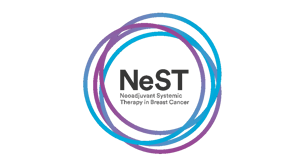NeST
Overview
NeST is a multicentre audit to evaluate current practice in the use of neoadjuvant systemic therapies (NST) to treat breast cancer. The audit aims:
- To establish current stated practice regarding the use of NST across the UK
To determine the current practice of NST, including:
- Indications for use
- Treatment modalities in common use
- Monitoring of response to treatment
- Pathological reporting of response to NST
- To explore surgical decision-making in the context of NST with respect to both the breast and axilla
- To explore the use of further adjuvant therapies (radiotherapy and systemic therapies) following NST
- To determine pathological response rates to NST in routine clinical practice
- To establish best practice with regard to the use of NST, with a view to generating national guidelines.
Objectives
This is a trainee-led multicentre audit, co-ordinated by the members of the NeST steering group.
Trainees from across the UK in both breast surgery and medical/clinical oncology will be invited to participate in the study, through the Mammary fold, the National Research Collaboratives and oncology trainee associations. A local trainee lead(s) will be identifying a supervising consultant and obtaining the necessary local audit approvals at their centre. Where there are no trainees within a unit, consultant, associate specialists, specialty doctors or research nurses will be encouraged to participate and enter data on behalp of their units.
There will be two phases to the study:
- A national practice questionnaire for MDTs, to determine stated practice within each unit
- A prospective audit phase for six months, collecting data on all women offered neoadjuvant systemic therapy (either chemotheraphy, hormonal therapy or targeted therapies) following MDT discussion.
Inclusion criteria for prospective audit
- Age > 16 years
- Histologically confirmed diagnosis of breast cancer
- MDT recommended treatment of neoadjuvant systemic therapy - including patients entering into trials of NST.
Exclusion criteria for prospective audit
- Patients entering "window of opportunity" clinical trials





